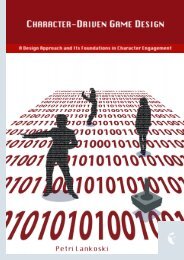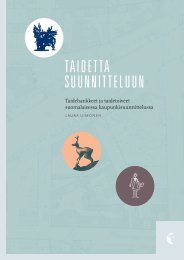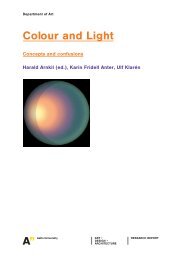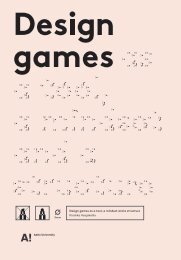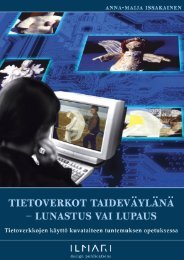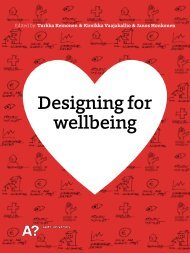Co-experience: Understanding user experiences in social interaction
Co-experience: Understanding user experiences in social interaction
Co-experience: Understanding user experiences in social interaction
Create successful ePaper yourself
Turn your PDF publications into a flip-book with our unique Google optimized e-Paper software.
context, the sett<strong>in</strong>g <strong>in</strong> which a person has <strong>experience</strong>s. The concept of co-<strong>experience</strong><br />
can help to alleviate this <strong>in</strong>dividualistic <strong>in</strong> design. The claim of this work<br />
is that although <strong>experience</strong> is <strong>in</strong> its essence most unique and subjective the<br />
way <strong>in</strong> which <strong>experience</strong>s “come to life” is a <strong>social</strong> phenomenon. Social <strong>in</strong>teraction<br />
can be seen as the context of mean<strong>in</strong>g mak<strong>in</strong>g, and at the same time its<br />
prime motivator.<br />
“<strong>Co</strong>-experienc<strong>in</strong>g” means experienc<strong>in</strong>g together, and it highlights the <strong>social</strong><br />
quality of this activity. As this work suggests, <strong>user</strong> <strong>experience</strong>s – the <strong>experience</strong>s<br />
that people create for themselves and others with products – can also be seen<br />
as <strong>in</strong>teraction. This work rests on a pragmatist philosophy that treats theories<br />
as tools and practical consequences as the measure of relevance (James 1995).<br />
The framework for co-<strong>experience</strong> is from symbolic <strong>in</strong>teractionism, a school of<br />
sociological thought that focuses on the <strong>in</strong>terpretation of mean<strong>in</strong>gs <strong>in</strong> <strong>social</strong><br />
<strong>in</strong>teraction (Blumer 1986). In co-<strong>experience</strong>, people are prompted to evaluate<br />
their <strong>experience</strong>s and offer them to the shared attention of others, and others<br />
are thus compelled to <strong>in</strong>terpret these <strong>experience</strong>s and respond <strong>in</strong> some way.<br />
People can participate <strong>in</strong> this exchange <strong>in</strong> many ways, with or without technology<br />
and <strong>in</strong> a variety of sett<strong>in</strong>gs. For example, as people were us<strong>in</strong>g new mobile<br />
multimedia phones to communicate with their friends, they simultaneously<br />
came to def<strong>in</strong>e the purpose for the technology as mutual enterta<strong>in</strong>ment and<br />
their relationships as mutual enterta<strong>in</strong>ers (Kosk<strong>in</strong>en, 2003b). These were the<br />
relevant <strong>experience</strong>s that they found the technology could provide. In a different<br />
<strong>social</strong> or co-<strong>experience</strong> context the actions of the people and the purpose<br />
of the technology could have become quite different.<br />
People have a desire to share <strong>experience</strong>s with their near and dear, wherever<br />
they may be and whether alone or <strong>in</strong> company. When design<strong>in</strong>g for and study<strong>in</strong>g<br />
<strong>user</strong> <strong>experience</strong>, follow<strong>in</strong>g the content of the grow<strong>in</strong>g shared attention, of<br />
co-<strong>experience</strong>, gives <strong>in</strong>sight both <strong>in</strong>to the lives of people and to the <strong>experience</strong>s<br />
they f<strong>in</strong>d mean<strong>in</strong>gful.<br />
1.2 THE EMERGING RELEVANCE OF USER EXPERIENCE<br />
16 1 INTRODUCTION<br />
How did <strong>user</strong> <strong>experience</strong> as a design term come about? Why is the literature on<br />
<strong>user</strong> <strong>experience</strong> so diverse? This can be attributed to how design as a group of<br />
discipl<strong>in</strong>es has evolved <strong>in</strong> response to new technologies and changes <strong>in</strong> consumer<br />
markets. The world of science has faced <strong>in</strong>creas<strong>in</strong>g specialisation of<br />
skills, knowledge and technologies. Technologies become <strong>in</strong>creas<strong>in</strong>gly smaller<br />
and more efficient while computation capacity <strong>in</strong>creases, which makes technological<br />
solutions cheaper and more widely applicable <strong>in</strong> consumer products. Pro-





